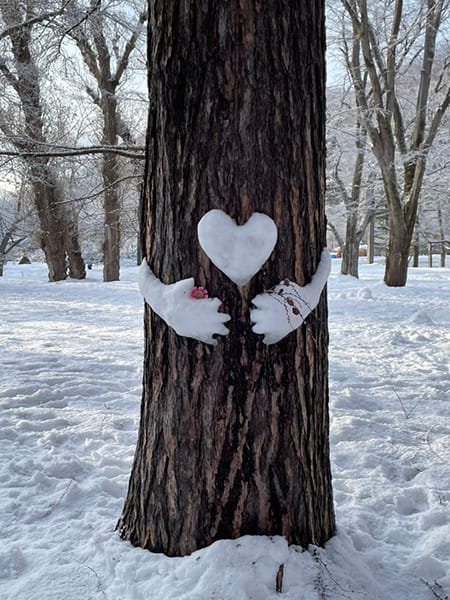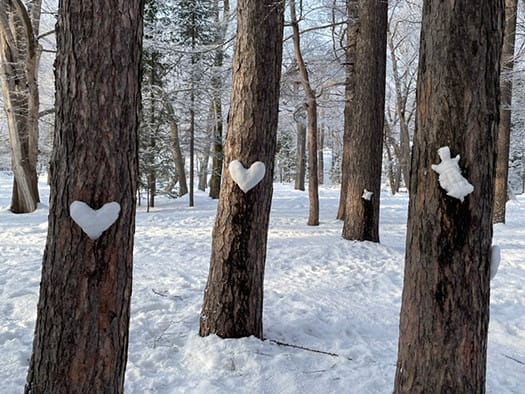

どうも最近、「やさしさ」パワーに弱くなっている(笑)。
街を歩いている子どもたちと会話する機会など、メロメロ感に包まれているけれど、その対象範囲は人間に限らず、イヌや小動物など全般にわたっている。とくに人とイヌの相互関係には深く癒される部分がある。きのうは人間が人為的に創っている「半自然」環境での自然の小動物との関係を取り上げたけれど、そういう部分って、人間と自然との関わりということに重なっていく。
さて、同じ札幌円山公園でのこの時期の「消えるアート」。
この歳になって、こういうふうに樹木に対してアートしたくなる、という感受性表現に不意を突かれた。
「おお、いいじゃん、こういうの」と肯定的に受け止めてしまっている自分がいる(笑)。
想像だけれど、この作者は女性、それもまだ幼い女児ではないかと思えた。っていうか、そのお母さんが同様の感受性を持った女性で、彼女がその娘さんといっしょになって、娘さんの目線で公園の樹木に対して雪のアートを仕掛けたのではないだろうか。
発想は幼児的だけれど、樹木に対しての「高さ」位置などはどうみても「大人目線」。そういう合作的な創造現場感が空気として遺っている。で、そういった「やさしさ」感に深くホッコリさせられて一本取られてしまって、立ち止まってニコニコしていた次第なのです。
まぁ、人工的自然樹林のなか、まるでディズニーのような世界を現出させようとしたそういう創作意図に対して、原初的な部分を刺激されたとも言えるでしょうか。
日本がこれからの世界の中で生き抜いていくときに、わたし的には「マンガパワー」というものはすごい文化資産なのではないかと思っています。鳥獣戯画を成立させた日本人の架空現実への想像力の深さは、その自然的な表現力に於いて隔絶していると思っている。
西欧世界のようなキリスト教という強い一神教の支配力や、中華皇帝独裁主義体制の文化とはまったく違う世界観を、それも人類共通の目線で表現している。だから、世界共通言語化できる文化性を持っている。
その基底にはやはり「やさしさ」パワーがあるように思う。
鳥獣戯画ではウサギなどが「擬人化」されてなんともいえない諧謔性と、見る者に「自由」な感覚を覚えさせてくれる。その世界観では人間の平等が表現されているとも感じさせられるのですね。
考えて見ると札幌円山公園というのは、開拓期にアメリカの人びとの「都市計画」によって円山の原始の自然が保全されることから整備が始まった。オモシロい精神文化を生み出す素地もあるのかも。
English version⬇
The Psychology of Modeling Snow in Sapporo Maruyama
The imaginary world of a cute little girl is sculpted into a nature conservation forest with the power of gentleness. The power of the melodious and dusty atmosphere will make you smile. The power of the melodious warmth will just make you smile.
I have recently become susceptible to the power of "gentleness" (laughs).
I am surrounded by a sense of melancholy when I have the opportunity to talk with children walking on the streets, but the scope of this feeling is not limited to humans, but extends to dogs and small animals in general. In particular, the mutual relationship between humans and canines is deeply healing. Yesterday, I discussed the relationship between humans and small animals in a "semi-natural" environment artificially created by humans, and this kind of relationship overlaps with the relationship between humans and nature.
The "disappearing art" of humans at this time of year in Maruyama Park, also in Sapporo.
The artist's expression of sensitivity to the fact that, at my age, I still feel the urge to make art of trees in this way caught me off-guard.
I found myself saying to myself, "Oh, that's nice, this kind of thing.
(Laughs) Although it is my imagination, I thought that the author was a woman, and a young girl at that. Or perhaps the mother was a woman with the same sensitivity, and she and her daughter set up the snow artwork on the trees in the park from the daughter's point of view.
The idea is infantile, but the height and position of the trees are clearly from an "adult's" perspective. This sense of collaboration at the creative site remains in the air. I was deeply moved by such "gentleness," and I stopped and smiled.
Well, I guess you could say that I was stimulated in a primitive way by the creative intention to create a Disney-like world in the midst of artificial natural forests.
In my opinion, the "power of manga" is a great cultural asset for Japan to survive in the world in the future. I believe that the depth of Japanese people's imagination for imaginary reality, which made the Birds, Beasts, and Caricatures possible, is separated in its natural expressive power.
They express a world view that is completely different from that of the Western world, which is dominated by the strong monotheistic religion of Christianity and the dictatorial regime of the Chinese emperors, from a perspective shared by all humankind. Therefore, it has a cultural quality that can be translated into a universal language.
At the base of this culture is the power of "gentleness.
In the Birds, Animals, and Caricatures, rabbits and other animals are anthropomorphized to create a sense of indescribable humor and freedom. In this worldview, it also makes us feel that the equality of human beings is expressed.
When you think about it, the development of Sapporo Maruyama Park began with the preservation of the pristine nature of Maruyama by the "urban planning" of the American people during the pioneering period. Perhaps it also has the basis for the creation of an interesting spiritual culture.










